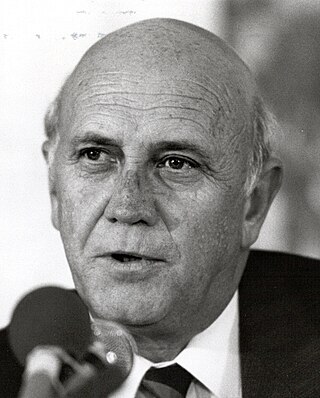
General elections were held in South Africa between 26 and 29 April 1994. The elections were the first in which citizens of all races were allowed to take part, and were therefore also the first held with universal suffrage. The election was conducted under the direction of the Independent Electoral Commission (IEC), and marked the culmination of the four-year process that ended apartheid.

The National Council of Provinces (NCOP) is the upper house of the Parliament of South Africa under the (post-apartheid) constitution which came into full effect in 1997. It replaced the former Senate, but is very similar to that body, and to many other upper houses of legislatures throughout the world, in that its purpose is to represent the governments of the provinces, rather than directly representing the people.

The National Assembly is the directly elected house of the Parliament of South Africa, located in Cape Town, Western Cape. It consists of four hundred members who are elected every five years using a party-list proportional representation system where half of the members are elected proportionally from nine provincial lists and the remaining half from national lists so as to restore proportionality.

The Western Cape Provincial Parliament (WCPP) is the legislature of the Western Cape province of South Africa. It is located at 7 Wale Street in Cape Town.
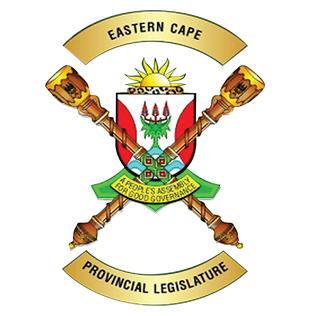
The Eastern Cape Provincial Legislature is the primary legislative body of the South African province of Eastern Cape. It is unicameral in its composition, and elects the premier and the provincial cabinet from among the members of the leading party or coalition in the parliament.
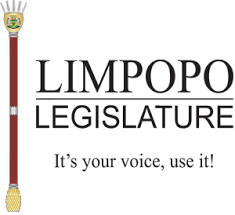
The Limpopo Provincial Legislature is the primary legislative body of the South African province of Limpopo.

The KwaZulu-Natal Legislature is the primary legislative body of the South African province of KwaZulu-Natal. It is unicameral in its composition and elects the premier and the provincial cabinet from among the leading party or coalition members in the parliament.
In South Africa, a provincial legislature is the legislative branch of the government of a province. The provincial legislatures are unicameral and vary in size from 30 to 80 members, depending on the population of the province. Each legislature is chaired by a Speaker and a Deputy Speaker.
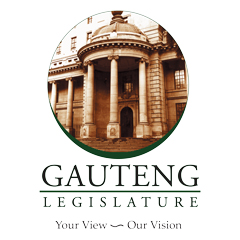
The Gauteng Provincial Legislature is the legislature of the South African province of Gauteng. It is a unicameral body of 73 members elected every five years. The current legislature, the sixth, was elected on 8 May 2019 and has an African National Congress majority of 37 members. The legislature is housed in Johannesburg City Hall in central Johannesburg.
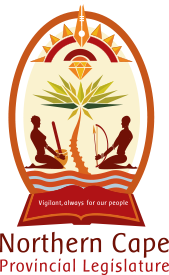
The Northern Cape Provincial Legislature is the legislature of the Northern Cape province of South Africa. It is a unicameral body of 30 members elected every five years. The current legislature was elected on 8 May 2019 and has an African National Congress majority of 18 members. It is situated in Kimberley, in a newly built complex to the west of the city centre on the edge of Galeshewe.

David Dabede "DD" Mabuza is a South African politician who served as deputy president of South Africa from February 2018 to February 2023. He was the deputy president of the African National Congress (ANC) from December 2017 to December 2022 and was previously the Premier of Mpumalanga from 2009 to 2018, throughout the presidency of his former political ally Jacob Zuma. Mabuza served as a Member of Parliament from 2018 until his resignation in 2023.

The North West Provincial Legislature is the primary legislative body of the South African province of North West. It is unicameral in its composition, and elects the premier and the provincial cabinet from among the members of the leading party or coalition in the parliament.

The Free State Provincial Legislature is the primary legislative body of the South African province of Free State. It is unicameral in its composition, and elects the premier and the executive council from among the members of the leading party or coalition in the parliament.
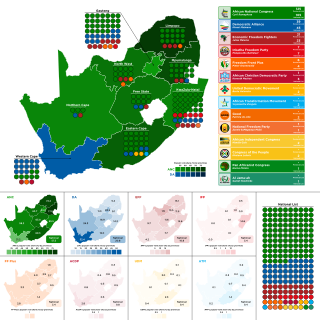
General elections were held in South Africa on 8 May 2019 to elect a new President, National Assembly and provincial legislatures in each province. These were the sixth elections held since the end of apartheid in 1994 and determined who would become the next President of South Africa.

The 27th South African Parliament is the sixth Parliament of South Africa to convene since the introduction of non-racial government in South Africa in 1994. It was elected in the general election of 8 May 2019 and consists of the National Assembly and the National Council of Provinces. The National Assembly contains 400 members, while the National Council of Provinces contains 90 members. It was formally opened by President Ramaphosa's State of the Nation Address in a joint sitting on 20 June 2019.
Bonakele Amos Majuba is a South African politician and educator who has served as the MEC for Education in Mpumalanga since May 2019. A member of the African National Congress, he has been a Member of the Mpumalanga Provincial Legislature since May 2009. Majuba was the deputy speaker of the provincial legislature between March 2018 and May 2019.
Motlalepula Ziphora Rosho is a South African politician. A member of the African National Congress, she was elected deputy speaker of the North West Provincial Legislature in 2010. In 2012 she was appointed as the Member of the Executive Council (MEC) for Economic Development, Environment, Conservation and Tourism in the North West Provincial Government. Rosho was discharged from the executive council in 2014 and then served in the provincial legislature as a committee chairperson until December 2018, when she returned to the executive as MEC for Local Government and Human Settlement. Rosho was appointed as MEC for Finance after the 2019 elections.
Azwindini Jeremiah Ndou, commonly known as Jerry Ndou, is a South African politician and diplomat who has served as a Delegate to the National Council of Provinces (NCOP) since October 2022. Before that, he represented the African National Congress (ANC) in the Limpopo Provincial Legislature and Limpopo Executive Council.
Blessing Thandi Shongwe is a South African politician who is currently serving as Mpumalanga's Member of the Executive Council (MEC) for Culture, Sport and Recreation. She formerly served as Speaker of the Mpumalanga Provincial Legislature from 2014 until March 2018, when she was first appointed to the Mpumalanga Executive Council. She is a member of the African National Congress (ANC).
Michael Collen Sedibe is a South African politician who is currently a Member of the Mpumalanga Provincial Legislature and the provincial leader of the legislature's official opposition party, the Economic Freedom Fighters (EFF). He joined the EFF in 2013 after he was expelled from the African National Congress and he was first elected to the provincial legislature in the 2014 general election. In September 2022, he was elected to a third term as the EFF's Provincial Chairperson in Mpumalanga.















